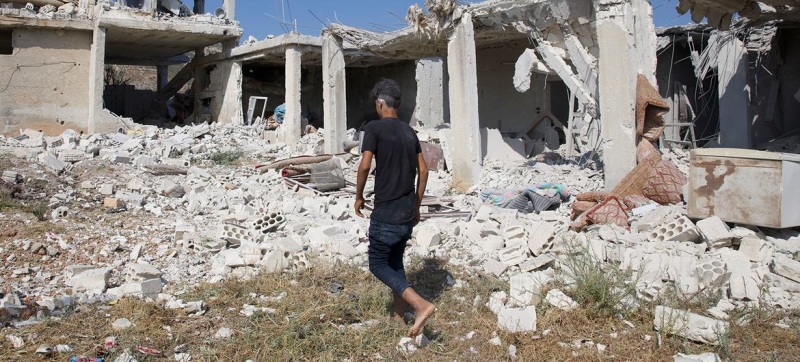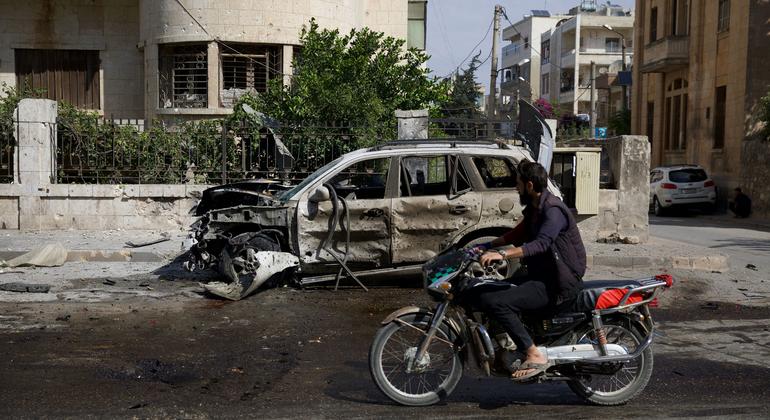
Destruction from airstrikes in Idlib in northeastern Syria in October 2023. UN Commission: Syria also desperately needs a ceasefire Peace and Security
Syria is experiencing its worst wave of violence since 2020. Parties to the conflict are likely to be committing war crimes, and the population is facing an unprecedented humanitarian crisis. The UN Commission of Inquiry on Syria warned about this in a report published on Monday.
Previously, UN Secretary-General António Guterres called on all parties involved in the conflict in Syria to “do everything necessary to achieve a genuine and credible political solution.”
By According to him, it is necessary to find a solution that meets the interests of the Syrian people, aimed at restoring the sovereignty, unity, independence and territorial integrity of the country in accordance with Security Council resolution 2254 (2015) and creating conditions for the voluntary return of refugees.
Ceasefire
“Since October, Syria has been experiencing the biggest escalation of fighting in four years,” Commission Chairman Paulo Pinheiro said. According to him, decisive action is now needed from the international community. Pinheiro noted that Syria “desperately needs a ceasefire.” and growing lawlessness fuels predatory practices and extortion by the military and militias,” he said.
Indiscriminate attacks
The intensification of fighting in Syria began on October 5, when explosions during a graduation ceremony at a military academy in the government-controlled city of Homs killed at least 63 people, including 37 civilians, and injured dozens.
Syrian and Russian forces responded by bombing at least 2,300 targets in areas controlled by their opponents, killing or injuring hundreds of civilians. Indiscriminate attacks on hospitals, schools, markets and camps for internally displaced persons may amount to war crimes, the Commission recalled.

“Syrian government forces are once again using cluster munitions in densely populated areas, continuing the destructive and illegal practices we have documented in the past,” said Commissioner Hanni Megalli.
According to him, as a result of the October attacks, about 120 thousand people were forced to leave their homes, many of them had previously been left homeless, including due to for the devastating earthquakes in February last year.
“It’s no surprise that the number of Syrians seeking asylum in Europe last October reached its highest level in seven years,” Megalli said. “Syria remains the world’s largest displacement crisis, with more than 13 million Syrians unable to return to their homes.”
Regional Tensions
According to the Commission, since the outbreak of hostilities in the Gaza Strip, tensions have increased among foreign armies operating in Syria, in particular between Israeli, Iranian and US forces, raising fears of a widening conflict. Israel has reportedly carried out strikes at least 35 times against suspected Iran-linked targets in Syria and has also attacked airports in Aleppo and Damascus, causing a temporary halt to UN humanitarian air services. Iran-backed militias also reportedly attacked US bases in northeastern Syria more than 100 times, to which the US responded with air strikes in eastern Syria.
Read also:
UN Special Envoy: Syria is feeling the consequences of a regional conflict
Meanwhile, in northeast Syria, the Turkish military has stepped up operations against the Kurdish-led Syrian Democratic Forces (SDF) in response to an attack in Ankara claimed by the Kurdistan Workers’ Party (PKK). According to the Commission, Turkish airstrikes deprived nearly a million people of water and electricity for several weeks, in violation of international humanitarian law. In addition, civilians have been killed in air attacks allegedly carried out by Turkish drones. Such attacks could amount to war crimes, the Commission noted.
In the northeast of the country, conflicts between the SDF and a coalition of tribal militants continue, which has already led to civilian casualties. Additionally, ISIS (Islamic State of Iraq and the Levant, also known as Daesh) has intensified its operations in central Syria. Meanwhile, clashes between Jordanian forces and drug smugglers have intensified along the Syrian-Jordanian border, resulting in civilian casualties.
Torture and ill-treatment
The commission documented an increase in the number of cases of ill-treatment and death in Syrian detention facilities. Four months after the International Court of Justice ordered the Syrian government not to torture or destroy evidence, Syrian authorities are still deliberately obstructing families’ efforts to determine the whereabouts and fate of their detained loved ones and engaging in extortion.
In addition, the Commission reports that Hayat Tahrir al-Sham (HTS) militants in Idlib continue to commit acts of torture, ill-treatment and unlawful imprisonment, with reports of arbitrary executions, including on charges of witchcraft and adultery. Several women’s rights organizations have suspended their activities due to threats and denials of permits.
Children’s rights
“Five years after the fall of Baghouz, when ISIS lost control of Syrian territory, nearly 30,000 children are still being held in camps, prisons or rehabilitation centers in northeast Syria,” said Commissioner Lynn Welchman. “These children were already victims during the reign of ISIS and are now again subjected to continued human rights violations for many years.”
The Commission concluded that the conditions in the Al-Hawl and Al-Rawj camps amounted to cruel and inhuman treatment and an attack on personal dignity.
Children should not be punished for the actions or beliefs of their parents, Welchman said.
Humanitarian needs
Currently, 16.7 million people in Syria are in need of humanitarian assistance. A severe shortage of donor funds has forced the UN to suspend regular food aid in the country, leaving millions at risk of starvation. At the same time, humanitarian supplies are difficult due to decisions of the Syrian government and international sanctions.
The commission will present its report to the UN Human Rights Council on March 18.
